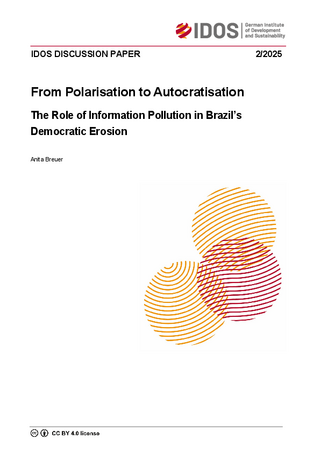From polarisation to autocratisation: the role of information pollution in Brazil's democratic erosion
Breuer, AnitaDiscussion Paper (2/2025)
Bonn: German Institute of Development and Sustainability (IDOS)
ISBN: 978-3-96021-245-4
DOI: https://doi.org/10.23661/idp2.2025
Price: 6 €
This study explores the complex relationship between information pollution, polarisation, and democracy in Brazil, a country that has recently experienced both democratic erosion and a pivotal democratic “U-turn”. Information pollution – the dissemination of false, misleading or harmful information – has become a global challenge, undermining societal peace and demo-cratic stability. In Brazil, these dynamics have been particularly pronounced, reflecting deep-seated socioeconomic inequalities and the impact of disinformation in an increasingly polarised political landscape.
Grounded in a holistic analytical framework, this study moves beyond the narrow conception of countering disinformation as a challenge confined to the digital space. By incorporating socio-economic, media, legislative and political contexts into the analysis, it provides a comprehensive understanding of the factors that facilitate the emergence of information pollution. By doing so, the framework also enables the formulation of tailored policy recommendations that consider the distinct characteristics of Brazil’s context, while offering lessons relevant to other countries facing similar challenges.
The analysis of the socioeconomic and social context highlights how in Brazil, persisting poverty and inequalities and the digital divide restrict access to diverse information sources, leaving marginalised groups disproportionately vulnerable to disinformation and hate speech. In this environment, hate speech targeting black women and members of the Lesbian, Gay, Bisexual, Transgender, Queer (and others) (LGBTQ+) community has been a prominent driver of polarisation, which exacerbates the discrimination and marginalisation of individuals at the intersection of race, gender and sexual orientation.
The characteristics of the Brazilian media landscape and information ecosystem further fuelled these dynamics. Highly concentrated media ownership and declining traditional journalism have undermined information diversity and opinion plurality. At the same time, digital platforms have become fertile ground for the spread of polarising narratives, driven by the rise of politainment and political messaging disguised as religious truth by influential evangelical leaders.
Within Brazil’s regulatory and institutional context, outdated legislation on internet governance has left significant gaps in the oversight of digital platforms. The implementation of existing transparency legislation is deficient and fragmented. Political interference and the misuse of secrecy laws have further undermined transparency mechanisms. Against this backdrop, state transparency offerings provide an inadequate counterweight to disinformation circulating on digital platforms.
The political context has exacerbated these challenges, with cultural and ideological divides exploited by political actors to erode trust in democratic institutions. Disinformation played a central role during the administration of Jair Bolsonaro who pursued a grievance-based mobilisation strategy, amplifying societal divisions by exploiting narratives around corruption, inequality and moral values. This approach triggered a process of affective polarisation, with religious rhetoric playing a significant role in framing political opponents as existential threats to traditional and conservative values.
Across all these contexts, vulnerabilities, such as low digital literacy, concentrated media consumption, and societal cleavages, amplify the impact of information pollution. This study finds that information pollution has fuelled affective polarisation, fostering mistrust, hostility, and violence, which in turn has jeopardised key elements of democratic quality, including respect for counterarguments, electoral integrity, institutional checks and balances, and public accountability and lastly support for democracy itself. The findings of this study point to critical entry points for addressing information pollution. At the national level, strengthening Brazil’s transparency regime emerges as a key priority, particularly by making access to public information more inclusive and enhancing the autonomy of institutions tasked with upholding transparency. The modernisation of Brazil’s internet governance framework is equally important, requiring broad based publication consultations and robust mechanisms for platform accountability. To ensure impartiality, authorities tasked with overseeing internet governance must maintain sufficient independence from the executive branch and should feature a cross-sectoral, multi-stakeholder composition, incorporating voices from civil society, academia, technical experts, and the private sector. At the international level, enhancing cross-border collaboration is paramount. The Global Digital Compact adopted in 2024 offers an important foundation for promoting shared technological solutions and fostering multilateral cooperation. Regional organisations in Latin America, such as the Organization of American States (OAS) and the Southern Common Market (MERCOSUR), also have a critical role to play in harmonising regulations and strengthening digital governance. Brazil’s recent experience illustrates the complex interplay between structural enablers, digital dynamics, and political strategies that drive polarisation and democratic erosion. At the same time, its ability to reverse autocratisation at the ballot box provides valuable lessons for curbing information pollution and fostering democratic resilience worldwide.


